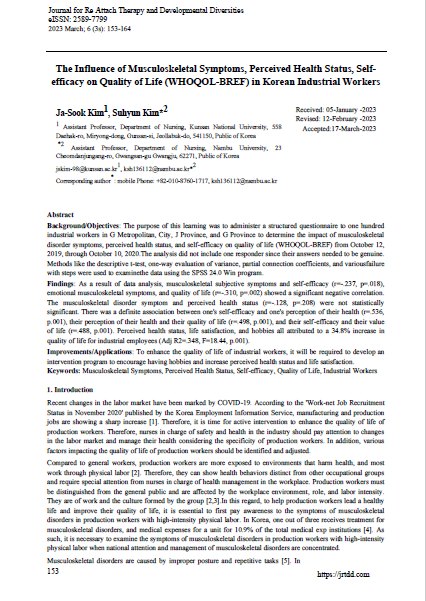The Influence of Musculoskeletal Symptoms, Perceived Health Status, Self-efficacy on Quality of Life (WHOQOL-BREF) in Korean Industrial Workers
Main Article Content
Abstract
Background/Objectives: The purpose of this learning was to administer a structured questionnaire to one hundred industrial workers in G Metropolitan, City, J Province, and G Province to determine the impact of musculoskeletal disorder symptoms, perceived health status, and self-efficacy on quality of life (WHOQOL-BREF) from October 12, 2019, through October 10, 2020.The analysis did not include one responder since their answers needed to be genuine. Methods like the descriptive t-test, one-way evaluation of variance, partial connection coefficients, and variousfailure with steps were used to examinethe data using the SPSS 24.0 Win program.
Findings: As a result of data analysis, musculoskeletal subjective symptoms and self-efficacy (r=-.237, p=.018), emotional musculoskeletal symptoms, and quality of life (r=-.310, p=.002) showed a significant negative correlation. The musculoskeletal disorder symptom and perceived health status (r=-.128, p=.208) were not statistically significant. There was a definite association between one's self-efficacy and one's perception of their health (r=.536, p.001), their perception of their health and their quality of life (r=.498, p.001), and their self-efficacy and their value of life (r=.488, p.001). Perceived health status, life satisfaction, and hobbies all attributed to a 34.8% increase in quality of life for industrial employees (Adj R2=.348, F=18.44, p.001).
Improvements/Applications: To enhance the quality of life of industrial workers, it will be required to develop an intervention program to encourage having hobbies and increase perceived health status and life satisfaction.

